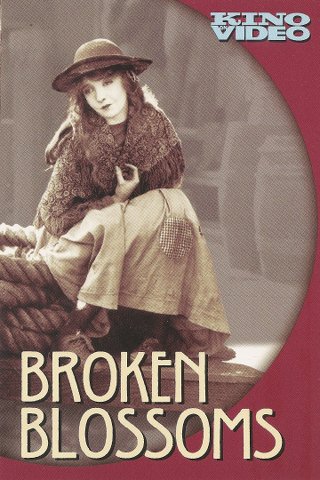A lonely young woman lives with her strict father who forbids her to wear make-up. One day at an ice cream social, she meets a young man you seems interested in her. However, unknown to her, he is a burglar who is only interested in breaking into her father’s house. One night she is awakened by a noise. Grabbing a pistol, she enters her father’s downstairs office where she confronts a masked intruder . . . Read More »
1910s
-
D.W. Griffith – The Painted Lady (1912)
Drama1911-1920D.W. GriffithSilentThe Birth of CinemaUSA -
D.W. Griffith – The Avenging Conscience: or ‘Thou Shalt Not Kill’ (1914)
1911-1920D.W. GriffithDramaSilentThe Birth of CinemaUSAThwarted by his despotic uncle from continuing his love affair, a young man turns to thoughts of murder. Experiencing a series of visions, he sees murder as a normal course of events in life and kills his uncle. Tortured by his conscience, his future sanity is uncertain as he is assailed by nightmarish visions of what he has done.Read More »
-
Yevgeni Bauer – Umirayushchii Lebed aka The Dying Swan (1917)
1911-1920DramaSilentUSSRYevgeni BauerMike Pinsky, DVDVerdict wrote:
Russian film poet Evgeni Bauer combined the technical virtuosity of D.W. Griffith with the haunting terror of Edgar Allan Poe and the artist’s eye of Johannes Vermeer. He is — perhaps — the greatest film director you have never heard of. During his brief four-year career, Evgeni Bauer created macabre masterpieces. They are dramas darkly obsessed with doomed love and death, astonishing for their graceful camera movements, risqué themes, opulent sets and chiaroscuro lighting. Tragically, Bauer died in 1917, succumbing to pneumonia after breaking his leg.Read More » -
Franz Hofer – Hurra! Einquartierung! (1913)
1911-1920ComedyFranz HoferGermanySilentThe Birth of CinemaThis film comes from the Schloss Archive of His Highness, Herr Graf Ferdinand von Galitzien:
Quote:
Born Franz Wygand Wüstenhöfer in Malstatt (Saarland), Hofer began his career as a stage actor and playwright in 1909. A year later he began working as a screenwriter for Messter’s Henny Porten series and for directors such as Viggo Larsen—Die schwarze Katze [The Black Cat] (1910)—and Walter Schmidthässler—Das Weib ohne Herz [The Woman Without a Heart] and Der Zug des Herzens [The Pull of the Heart] (both 1912).Read More » -
?-The Christmas Miracle (1912)
1911-1920DramaFranceSilent
IMDB:
A poor woman, with no money for Christmas presents, tucks her three children in for the night, on Christmas Eve. Later, a poor, old beggar comes to her door and she lets him in to rest and warm up. When he suddenly leaves, she follows him to the front door of a church, where she finds an abandoned baby. The woman takes the baby home to care for it, even though she has almost nothing. Her acts of kindness are repaid with a Christmas miracle. Written by Detour 1945 Read More » -
D.W. Griffith – Broken Blossoms or The Yellow Man and the Girl (1919)
1911-1920D.W. GriffithDramaSilentUSADon Druker, Chicago Reader wrote:
One of D.W. Griffith’s most beautiful films, a 1919 tale of the chaste love of a Chinese man (Richard Barthelmess) for the frail daughter (Lillian Gish) of a loutish boxer. It perfectly fuses all the elements of Griffith’s style: tender drama played off against scenes of violence; a rich, operatic sense of character and emotion; and a dreamlike acting style, given particular force by the subtlety of Gish’s performance and the strength of Barthelmess’s.Read More » -
Enrico Guazzoni – Agrippina (1911)
1911-1920Enrico GuazzoniEpicItalySilentSummary:
After the death of Claudius, Agrippina announced Nero the heir to the throne, which leads to despair of the true heir – Brittanicus.
Not daring to oppose Agrippina, Senators declare Nero the emperor.
Agrippina is against of an affair of Nero and Poppaea.
Agrippina threaten Nero that if he neglect his wife Octavius, she will give the throne to Brittanicus.
The threats of Agrippina had their effect. Brittanicus is poisoned.
Perversity of Nero is insatiable and he gives his trusted man, Anicetus a terrible order.
Agrippina is looking for salvation, but the indomitable hatred of Emperor Nero decides the fate of Agrippina…Read More » -
August Blom – Den hvide slavehandel aka The White Slave Trade (1910)
1901-1910August BlomDenmarkSilentThe Birth of Cinema“Anna, a young girl from a poor but honest household, is offered an attractive position as a lady’s companion in London. Her childhood friend is worried, but she goes anyway. To Anna’s horror, the distinguished house turns out to be a brothel, but she manages to overpower her first customer. A helpful maid smuggles out a letter to her parents, and they alert the League for the Suppression of the White Slave Traffic. The childhood friend travels to England and hires a detective. Together, they find the brothel and Anna. They arrange her escape. Anna lowers herself down from her window, but after an automobile chase, the slavers overpower her liberators and abduct her again.Read More »
-
Yakov Protazanov – Pikovaya dama AKA The Queen of Spades (1916)
1911-1920DramaSilentUSSRYakov ProtazanovAlready in the early years of Russian cinema Protazanov’s name was a hallmark of artistic excellence. “The Queen of Spades” is a brilliant example of his extraordinary talent. The film has not only a first-rate story and ingenious Mozzhukhin’s performance, but also all the tricks that were available to filmmakers in 1916. The use of crosscutting in the film is quite sophisticated for the time; superimposition is yet another important device; and the use of flashbacks here is very effective. Unlike most pictures of that time “The Queen of Spades” made a genuine contribution to the evolution of Russian film art. I think it would be great if more people see one of the best pre-revolutionary Russian films.Read More »









